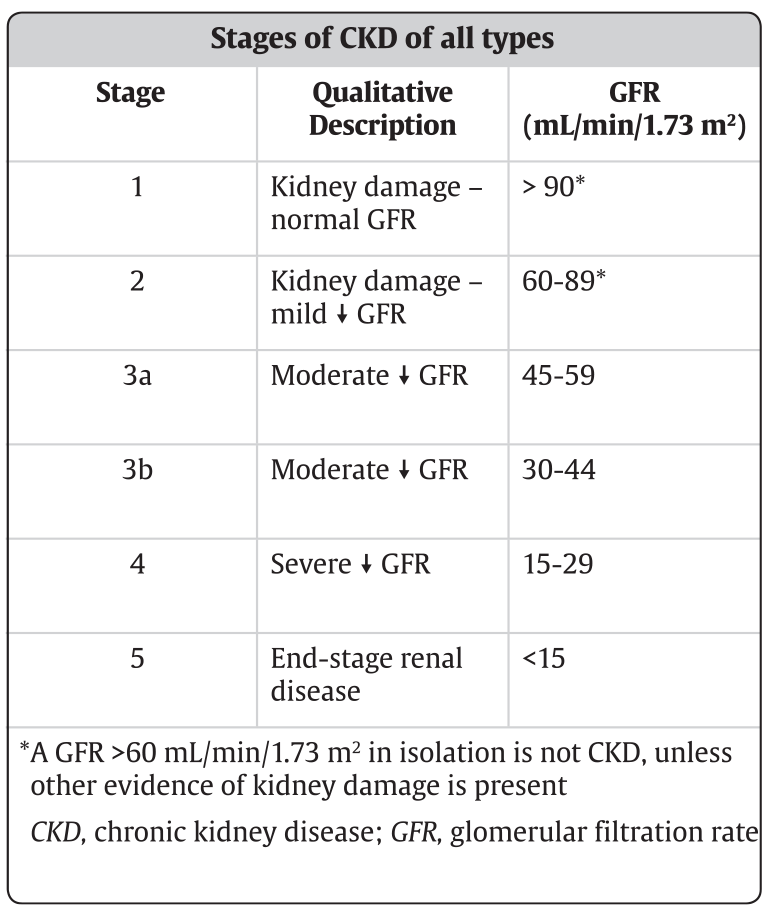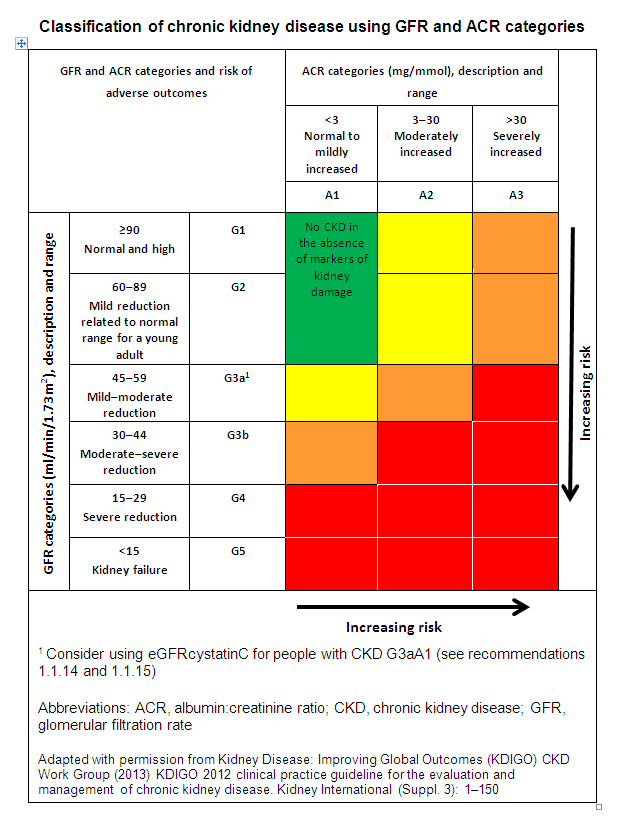Kidney blood tests explained
Keep track of your kidney data with PKB
In this article, we will explain the commonly measured kidney blood tests, urine and other tests.
-
Minerals
-
Kidney function tests
-
Other electrolytes
-
Liver tests
-
Bone tests
-
Lipids (fats)
-
Haematology (blood).
Minerals
Sodium (Na)
Sodium is a mineral in the blood that is involved with water levels in the blood, and blood pressure. It is usually normal in CKD. Normal is 135-145 mmol/L.
Extremely low <120
Low < 130
Moderately low <135
Good (normal) 135-145 mmol/L
Moderately high >145
High > 150
Extremely high >155
Potassium (K)
Potassium is a mineral in your blood that helps your heart and muscles work properly. A potassium level that is too high or too low may affect your heartbeat and weaken muscles. Whether you need to change the amount of high-potassium foods in your diet depends on your stage of chronic kidney disease.
Ask your doctor what your potassium level should be. Your dietitian can help you plan your diet to get the right amount of potassium. Normal is 3.5-5.3 mmol/L.
Extremely low < 2
Very low <2.5
Low <3.5
Good (normal) 3.5-5.3 mmol/L
High >5.3
Very high >6
Extremely high > 6.5
What blood tests show kidney function?
Urea
Urea is a normal waste product in your blood that comes from the breakdown of protein from the foods you eat and from your body metabolism. It is normally removed from your blood by your kidneys. But when kidney function reduces in CKD, the urea level rises. In this way it is similar to your blood creatinine level. Urea can also rise if you eat more protein, and it can fall if you eat less protein. Normal is 3-7 mmol/L.
Low < 3
Good 3-7 mmol/L
High >7
Very high > 15
Extremely high >40
Creatinine (creat, Cr)
Creatinine is a waste product in your blood that comes from muscle activity. It is normally removed from your blood by your kidneys. But when kidney function reduces in CKD, the creatinine level rises. Your doctor uses the results of your blood creatinine level to calculate your GFR – the higher the creatinine, the lower the GFR, the worse the kidney function. Normal is 60-120 mcmol/L.
Good (normal) < 120 mcmol/L
Moderately raised 120-200
High >200
Very high >300
Extremely high >400
Needs dialysis (or transplant) >500
Glomerular filtration rate (GFR)
GFR tells you how much kidney function you have – the higher the number, the better is the kidney function. It is calculated from your blood level of creatinine. Normal is 90-120 ml/min. There are 5 stages of CKD as shown in this table.

If your GFR falls below 60 ml/min (Stage 3A CKD), your GP should discuss you with a hospital based kidney disease specialist (called a nephrologist). If your GFR is less than 30 ml/min (Stage 4 CKD) you should see a nephrologist soon. A GFR below 15 ml/min (Stage 5 CKD) indicates that you need to start a treatment for kidney failure (dialysis or a kidney transplant), and you need to see a nephrologist ASAP.
Urine albumin-to-creatinine ratio (uACR)
When your kidneys are damaged, protein (especially one called albumin) may leak into your urine. This is called proteinuria. A simple urine test called an ACR is done to detect protein in your urine. Persistent protein in the urine is an early sign of chronic kidney disease. ACR should be < 3 mg/mmol.
Good (normal) <3 mg/mmol
Moderately high 3-30
High >30
Extremely high > 100 (‘nephrotic range’)
Nephrotic syndrome (severe) > 220
Urine ACR and GFR/CKD
Urine ACR is combined with the CKD stage (Grade or ‘G’ 1-5) to estimate the outlook for someone with CKD. In other words, CKD can be described in one patient as ‘CKD G4 A3’, and that has a worse outlook than for a patient with ‘CKD G2 A1’. So a higher level of albuminuria worsens the outlook as does a lower GFR. This dual classification is shown in this table.

Other electrolytes
Glucose (‘gluc’)
Glucose is a sugar in the blood that is raised in diabetes. It is normal in CKD, unless you have diabetes. Normal glucose is 4-6 mmol/L.
Very low <2
Low <4
Good (normal) 4-6 mmol/L
Moderately high >7
High >14
Very high >20
Extremely high >40
Bicarbonate (HCO3)
Bicarbonate is an alkali (opposite of acid) in the blood. The test measures the acidity of the blood; the lower the bicarbonate, the more acidic. In CKD acid is not removed adequately, leading to a reduction in blood bicarbonate level. Normal is 22-28 mmol/L.
Good (normal) 22-28 mmol/L
Low <22
Very low <18
Extremely low < 14
Liver tests
Albumin
Albumin is a type of body protein made from the protein you eat each day. A low level of albumin in your blood may be caused by not getting enough protein or calories from your diet. It can also be low in nephrotic syndrome (and some causes of CKD) when the kidneys are leaky and allow too much protein in the urine.
A low level of albumin may lead to health problems such as difficulty fighting off infections. Ask your dietitian how to get the right amount of protein and calories from your diet. Normal is 35-50g/L.
Good (normal) 35-50 g/L
Low <30
Very low <25
Extremely low <20
Liver functions tests (LFTs, or ‘liver enzymes’)
LFTs reflect liver health. They include bilirubin (‘bili’), alanine aminotransferase (‘ALT’), aspartate aminotransferase (‘AST’) and alkaline phosphate (‘alk phos’) – and are usually normal in CKD.
Bone tests
Calcium (Ca)
Calcium is a mineral in the blood that is important for strong bones. The blood calcium level can be low in CKD (and linked to a high phosphate level). A low calcium level can lead to weak bones. To help balance the amount of calcium in your blood, your doctor may ask you to take calcium supplements (e.g. calcium acetate) and a special prescription form of vitamin D (e.g. alfacalcidol).
Take only the supplements and medications recommended by your doctor. Blood calcium can also be high, especially in advanced CKD. This can eventually lead to epileptic fits and even coma. Normal is 2.2-2.6 mmol/L.
Extremely high >3.5
Very high >3.0
High >2.6
Good (normal) 2.2-2.6 mmol/L
Low <2.0
Very low <1.8
Extremely low <1.4
Phosphate (phos, PO4)
Phosphate is a mineral in the blood that is important for strong bones. The blood phosphate level can be high in CKD (and is linked to a low calcium level). A high phosphate level can lead to weak bones. If your level is too high, your doctor may ask you to reduce your intake of foods that are high in phosphate and take a type of medication called a ‘phosphate’ binder (e.g. calcium acetate) with your meals and snacks. Normal is 0.8-1.4 mmol/L.
Good (normal) 0.8-1.4
High >1.4
Very high >2.0
Extremely high >2.5
Parathyroid hormone (PTH)
PTH a hormone (chemical) made by four tiny parathyroid glands on the back of the thyroid gland in the neck. A high parathyroid hormone (PTH) level, which rises in CKD, indicates you have renal bone disease, one of the complications of CKD.
It is linked to a low calcium and high phosphate level in your blood. Your doctor may prescribe a form of vitamin D (e.g. alfacalcidol) to help lower your PTH. Normal PTH is <5 pcmol/L.
Caution – do not take over-the-counter vitamin D unless requested by your doctor.
Lipids (fats)
Cholesterol
Cholesterol is a fat-like substance found in your blood. A high cholesterol level may increase your chance of having heart, brain and circulation problems. If your cholesterol level is too high, your doctor may ask you to make some changes in your diet and increase your activity level. In some cases, medications (e.g. ‘statins’) are also used. The target level for cholesterol is below 5 mmol/L.
Good (normal) 3-5 mmol/L
OK 5-6
High >6
HDL cholesterol
HDL cholesterol is a type of ‘good’ cholesterol that protects your heart. The target level for HDL cholesterol is more than 1 mmol/L.
LDL cholesterol
LDL cholesterol is a type of ‘bad’ cholesterol. A high LDL level may increase your chance of having heart, brain and circulation problems. If your LDL level is too high, your doctor may ask you to make some changes in your diet and increase your activity level. The target level for LDL cholesterol is below 4 mmol/L.
Triglyceride (TG)
Triglyceride is a type of fat found in your blood. A high triglyceride level along with high levels of total and LDL cholesterol may increase your chance of heart, brain and circulation problems. The target level for triglyceride is below 1.7 mmol/L.
Haematology
Haemoglobin (Hb)
Haemoglobin is the part of a red blood cell that carries oxygen from your lungs to all parts of your body. A low Hb tells your doctor you have anemia, which makes you feel tired and have little energy – i.e. the higher the number, the more red cells you have, the better.
Normal Hb is 110-150 g/L in a woman, and 130-170 g/L in a man. If the Hb is less than 100 g/L, you may be prescribed erythropoietin (EPO) as an injection or tablets, and the target is 110-120 g/L.
Ferritin
Ferritin (pronounced ‘ferry-tin’) measures the iron levels in your body. Iron helps you build red blood cells. For EPO injections or tablets (see Hb below) to work well, ferritin needs to be adequate. Your doctor may recommend iron injections or tablets if your ferritin is low. The blood ferritin level should be above 100 mcg/L.
Summary
We have explained kidney blood tests. We hope it has been helpful.
Last Reviewed on 3 July 2024
